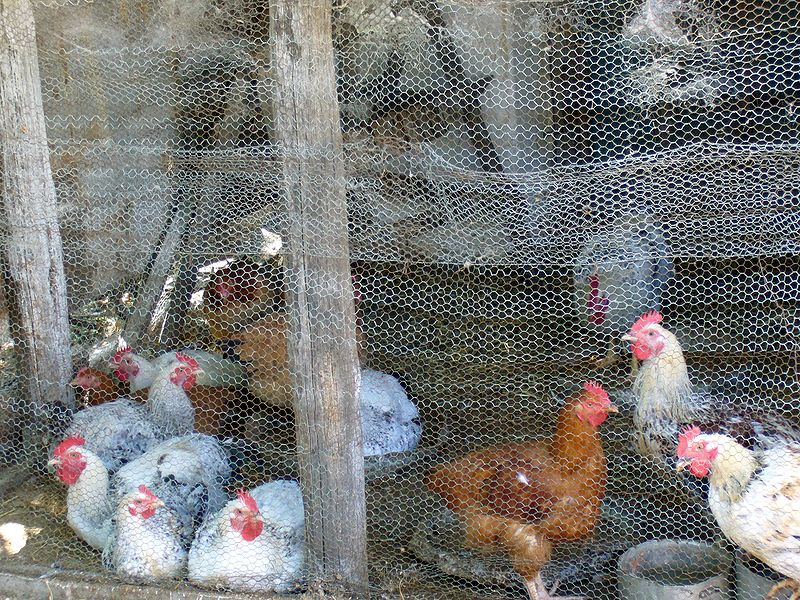 |
| Chicken behind chicken wire in a hen house |
First Draft:
Our oral traditions—our food, stories,
Our oral traditions—our food, stories,
and smokes—anything that enters or leaves
our mouths—expands or contracts spirit, mind,
body and art. When I consulted Thich
body and art. When I consulted Thich
Nhat Hanh for how to heal my recurring
anger, I learned that
when you constantly
eat anger it becomes you. Look at hens
under factory conditions. Anger. What do
cows raised in little boxes feel? What love
goes into new calves and cow's milk? What else
besides anger do we eat and transmit?
Is it even possible to feed mass
populations on kindness and love instead
of anger and unhappiness?
I tried
and failed at home gardening. I angered
native weeds and saplings by replacing
them in one fell swoop to plant tomatoes,
so sought out farm-to-table growers and
free-range animals to buy in the form
of food. I stopped watching horror and war
movies, watched non-commercial TV, and
so sought out farm-to-table growers and
free-range animals to buy in the form
of food. I stopped watching horror and war
movies, watched non-commercial TV, and
took in two
rescue kittens to share my love.
I’ve been wooing them for three years, but they
still rush off spooked, or snarl and snap at me
when I reach for them.
Now I read labels
on their food as well as my own, seeking
out what might be poisoning them, pushing
them toward anger. I
scan lyrics, too,
of songs, news broadcasts and bedtime stories.
I am slower to anger, and I have
softer dreams. In truth, there is little time
left to judge others now that I’m busy
feeding kindness into souls right at home.
For earthweal's weekly challenge: CONNECTING HUMANS, WILDLIFE AND THE CORONA VIRUS
Revised 4/17/2020 (but I'm not happy yet)
For earthweal's weekly challenge: CONNECTING HUMANS, WILDLIFE AND THE CORONA VIRUS
![Anger by [Thich Hanh]](https://m.media-amazon.com/images/I/41JcBF-p8QL.jpg) |
| I found this audio book quite helpful! |
Revised 4/17/2020 (but I'm not happy yet)
Stop eating anger,
Thich Nhat Hanh told me.
You cannot stop being angry if you
constantly eat it. Look
at hens living
in factory conditions. Anger. What do
cows raised in little boxes feel? What love
goes into new calves and cow's milk? What else
besides anger do we eat and transmit?
I failed at home gardening.
I angered
local gods by replacing native plants
with tomatoes, lettuce, and carrots—
with tomatoes, lettuce, and carrots—
none of which thrived. So I sought out farm-to-
table veggies and free-range animals
to eat happier food. I
spurned horror
and war films and rescued two cats.
I’ve wooed those cats for three years, but they still
spook, snarl or snap at me when I touch them.
Now I read labels on cat food, to learn
what anger they are eating.
I censor
lyrics, news broadcasts and bedtime stories.
I’m slower to anger; I have softer
dreams; and my cats show affection to me.
In truth, I have little time left to judge
others,
when serving kindness right at home.
My blog poems are rough drafts.
Please respect my copyright.
If you quote, credit this page.
© 2020 Susan L. Chast
I love this so much, every single thing about it.........it is true, we are what we eat. I made that shift, too, when I learned about the conditions of factory animals (and what is pumped into them), their lives of fear, pain and despair. The global wildlife trade and wet markets are even more horrendous. I love that you rescued two kitties and though they may get triggered by bad memories occasionally, mostly they trust you and are grateful for your care, I am sure. I especially LOVE your closing, where you are busy feeding kindness at home. So glad you wrote about this angle for my prompt, Susan. Many thanks. Have you heard Ted Talks by Valerie Kaur? I am sure you must have. She speaks so wonderfully about rage versus radical loving kindness.
ReplyDeleteSusan, I love your poem correlating what we ingest with what we exude. I've been vegetarian for many years because I've known about how cruel factory farming is. I don't feel anger as much as I feel sadness for all the world's cruelty, and hatred. This consumes me at times, but I too find comfort in reading some spiritual leaders and practicing what can bring me hope and some joy. May you be well, healthy and safe.
ReplyDeleteWonderful reorientation in this, from finding oneself angered by angry meat to planting love in every hostile spot. Yes. - Brendan
ReplyDelete